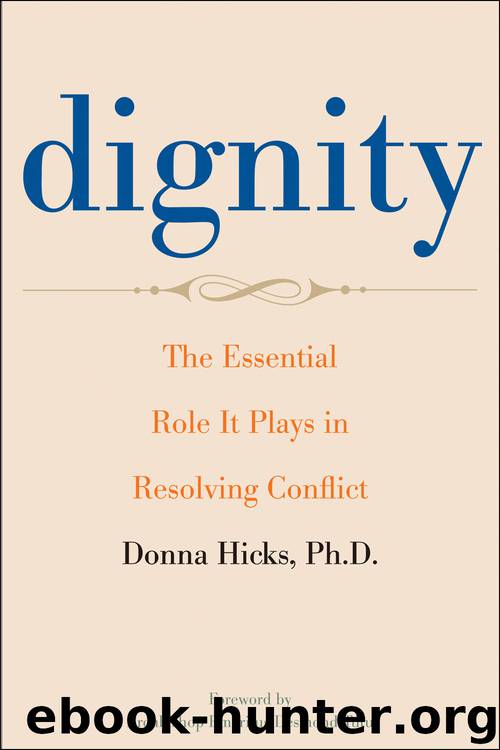Dignity by Donna Hicks

Author:Donna Hicks
Language: eng
Format: epub
Publisher: Yale University Press
Published: 2011-04-20T04:00:00+00:00
14
Seeking False Dignity
Beware of the desire for external recognition in the form of approval and praise. If we depend on others alone for validation of our worth, we are seeking false dignity. Authentic dignity resides within us.
Don’t be lured by false dignity.
Scenario One. I have a friend (I will call her Maura) who has frequent bouts of depression. In a vulnerable moment, she once told me that she never feels as though she measures up; she has a hard time seeing anything but her imperfections, and her internal dialogue is fraught with self-doubt. Looking at her from the outside, I find it hard to imagine why. She is smart and attractive, has a high-status job, and makes a six-figure salary.
True, her personal life was a mess. She attributes her difficulty in maintaining a relationship to her demanding job. When I asked her why she worked such long hours, she confessed that the office was the only place where she felt good about herself. Much of her sense of well-being derives from her status as a businesswoman. She was terrified at the thought of losing her job—the primary source of her sense of worth and well-being.
Scenario Two. Many of the successful men I know have a common refrain: “I’ve made it. I have all the money I need, I can go where I want, I do what I want, and I don’t have to answer to anyone.” One friend, whom I will call Jerry, confessed to me that despite rating high on all the external measures of success, he still doesn’t feel at peace with himself. He often feels inferior to others and is afraid that people will eventually see him for who he really is: weak, vulnerable, and fearful. He said that he often feels uncomfortable in social situations, even though others find him funny, engaging, and delightful to be with. He has to work very hard to relax with people, especially those he looks up to.
Scenario Three. Mae and Lavinia (not their real names) met during their first year at an all-girl boarding school in Massachusetts. They were both fourteen years old, international students from Hong Kong, and in the same grade. Lavinia comes from a family of high-powered architects, lawyers, and Ivy League graduates—an elite family, especially in Hong Kong, where class divisions are clearly understood. Mae, on the other hand, comes from a family of blue-collar workers and farmers; she was the first in her family to go to college.
Many class-related dignity violations arose in the decade of interaction between Mae and Lavinia. According to Mae, Lavinia’s high status in Hong Kong society meant that she was raised to believe that she was better than any ordinary worker. Her attitude of superiority dominated many of their interactions, often leaving Mae feeling humiliated in front of others.
One of Lavinia’s favorite ways of putting Mae down was to make fun of her Chinese accent when they were together with American friends. Lavinia, who had been raised by a British nanny, spoke excellent English.
Download
This site does not store any files on its server. We only index and link to content provided by other sites. Please contact the content providers to delete copyright contents if any and email us, we'll remove relevant links or contents immediately.
Should I Stay or Should I Go? by Ramani Durvasula(7644)
Why We Sleep: Unlocking the Power of Sleep and Dreams by Matthew Walker(6691)
Fear by Osho(4724)
Flow by Mihaly Csikszentmihalyi(4682)
Rising Strong by Brene Brown(4444)
Why We Sleep by Matthew Walker(4428)
The Hacking of the American Mind by Robert H. Lustig(4368)
How to Change Your Mind by Michael Pollan(4348)
Too Much and Not the Mood by Durga Chew-Bose(4332)
Lost Connections by Johann Hari(4168)
He's Just Not That Into You by Greg Behrendt & Liz Tuccillo(3876)
Evolve Your Brain by Joe Dispenza(3661)
The Courage to Be Disliked by Ichiro Kishimi & Fumitake Koga(3477)
Crazy Is My Superpower by A.J. Mendez Brooks(3386)
In Cold Blood by Truman Capote(3374)
Resisting Happiness by Matthew Kelly(3335)
What If This Were Enough? by Heather Havrilesky(3302)
The Book of Human Emotions by Tiffany Watt Smith(3289)
Descartes' Error by Antonio Damasio(3268)
